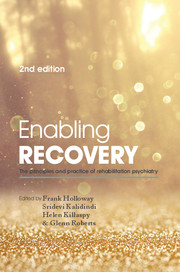Book contents
- Frontmatter
- Contents
- List of contributors
- List of figures, tables and boxes
- Preface
- Part 1 Setting the scene
- Part 2 Treatment approaches
- Part 3 Key elements of a rehabilitation service
- 16 Key elements of a rehabilitation service: overview
- 17 Rehabilitation in hospital settings
- 18 Community-based rehabilitation and recovery
- 19 Housing: a place to live
- 20 Work and employment
- 21 Peer support in mental health services
- 22 Leadership, management and service development in rehabilitation practice
- Part 4 Special topics in psychiatric rehabilitation
- Part 5 Future directions
- Index
19 - Housing: a place to live
from Part 3 - Key elements of a rehabilitation service
Published online by Cambridge University Press: 02 January 2018
- Frontmatter
- Contents
- List of contributors
- List of figures, tables and boxes
- Preface
- Part 1 Setting the scene
- Part 2 Treatment approaches
- Part 3 Key elements of a rehabilitation service
- 16 Key elements of a rehabilitation service: overview
- 17 Rehabilitation in hospital settings
- 18 Community-based rehabilitation and recovery
- 19 Housing: a place to live
- 20 Work and employment
- 21 Peer support in mental health services
- 22 Leadership, management and service development in rehabilitation practice
- Part 4 Special topics in psychiatric rehabilitation
- Part 5 Future directions
- Index
Summary
Introduction
This chapter describes the history, development and evidence for supported accommodation for people with mental health problems. Clearly, people with mental health problems who do not reside in supported accommodation also need somewhere to live and support to remain as well as possible and maintain their home successfully: in the UK most live alone, although many do live with family. People living in supported accommodation will require the interventions described in Part 2 of this book (‘Treatment approaches’), delivered by the community-based services described in Chapter 18, ‘Community-based rehabilitation and recovery’; these are not reiterated here.
Specialist supported accommodation for people with mental health problems includes nursing and residential care homes, group homes, hostels, blocks of individual or shared tenancies with staff on site, and independent tenancies with ‘floating’ or outreach support from staff. In 2006 it was estimated that around 12 500 people with mental health problems in England were in a nursing or residential care home (National Statistics, 2006), although a recent ‘freedom of information’ enquiry to the organisations commissioning these services – local authorities and National Health Service (NHS) primary care trusts – puts the figure much higher, at around 30 000 (Killaspy & Meier, 2010). This discrepancy could be due to changes in the registration processes for these kinds of facilities, which have led to an increase in the number of homes formally registered, rather than an increase in the actual number of people residing in them, although there has also been greater use of nursing and residential care for people with longer-term mental health problems in the UK in recent years owing to disinvestment in local rehabilitation services (on the ‘virtual asylum’, see Chapter 17, ‘Rehabilitation in hospital settings’). In 2006, around 160 000 people in England were receiving floating outreach services, of whom around 15% (24 000) were classified as receiving a specialist mental health floating outreach service (Department of Communities and Local Government, 2006).
- Type
- Chapter
- Information
- Enabling Recovery , pp. 295 - 307Publisher: Royal College of PsychiatristsPrint publication year: 2015



